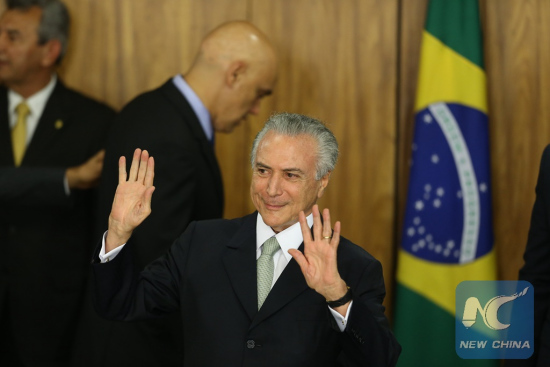
Brazil's acting President Michel Temer takes part in the inauguration ceremony of the new ministers of his government, at the Planalto Palace in Brasilia, Brazil, on May 12, 2016. (Xinhua/Dida Sampaio/Estadao Conteudo/AGENCIA ESTADO)
The political change in Brazil featuring interim President Michel Temer's government reshuffle and major policy shift has posed a test of the capability of the five-nation bloc of BIRCS to promote economic development through multilateral cooperation.
Temer has made a radical reshuffle of Brazil's cabinet and adjusted the country's external policies as of Sunday, one month after President Dilma Rousseff was suspended from office pending her impeachment trial.
Analysts said Brazil's interim government is likely to put its cooperation with other BRICS countries -- Russia, India, China and South Africa -- in a secondary place. Whether the BRICS countries stand united and whether their cooperation mechanism functions smoothly will be crucial for the development of the bloc.
MAJOR SHIFT IN FOREIGN POLICIES
Brazil always valued its cooperative relations with other BRICS countries after the birth of the bloc in 2009. However, the political developments in Brazil since the suspension of Rousseff from office are resulting in readjustment of its foreign policies.
Interim Foreign Minister Jose Serra outlined new priorities in foreign policies in his first public appearance on May 18.
According to him, Brazil would instead put emphasis on bilateral ties with Argentina and Mexico and, meanwhile, make it a priority to restore the "traditional partnerships" with the United States, Europe and Japan.
On cooperation with other BRICS countries, Serra said Brazil will seize opportunities brought about by this mechanism with an eye to enhancing trade and investment cooperation among its members.
A subtle difference was noticed from the terms frequently used by Rousseff such as "strategic cooperation" and "diplomatic priorities."
Amid the volatile political situation in Brazil, the fate of Rousseff remains to be seen before the last two rounds of vote at the Senate.
Zhou Zhiwei, executive director of the Brazil Research Center, a unit of the Chinese Academy of Social Sciences, said that no matter what the final result is, the fermenting political crisis could lead to a "backtrack" in the foreign policy of Brazil and affect its dedication to the BRICS mechanism in the short term.


















































